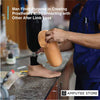How to Stop Yourself from Overthinking
Do you find yourself overthinking and losing sleep over it? Unfortunately, this is a common problem among people. Studies have shown that 73% of individuals aged 25-35 and 52% of those aged 45-55 tend to overthink.

However, overthinking is often unproductive and can be harmful. It drains our energy, increases stress and anxiety, and is linked to various mental health issues. But how can we differentiate between critical thinking and overthinking? What makes realistic thoughts different from intrusive negative thinking? It's important to understand these differences.
What is overthinking?
Thinking ahead to potential issues can be a helpful way to solve problems proactively. However, overthinking often leads to dwelling on a particular issue for too long without finding a solution, causing a spiral that feels like a trap.
Overthinking is more than just worrying or preparing for something. It involves destructive thought patterns such as constant worrying and rumination. Overthinking can become a habit that is hard to break.
Rumination involves dwelling on past experiences, especially those that were embarrassing or caused mistakes. This thinking can be harmful if it doesn't lead to a solution or lesson learned.
Why do we overthink?
Overthinking and stress exist as survival mechanisms, both serving as means of survival in the past when humans needed to hunt, find shelter, and avoid danger. However, in modern times, we are less likely to face life-threatening situations regularly. As a result, overthinking as a survival mechanism is less helpful and more harmful. Nevertheless, it is still a part of human nature.
Several factors can trigger overthinking, including social expectations, perceptions of failure, and past experiences. Certain types of people, such as highly sensitive and insecure individuals, are more susceptible to overthinking than others.
Keep track of patterns and potential triggers
It's important to note when your overthinking occurs - before your prosthetic rehabilitation session, during a specific season, or when you feel more stressed. By doing so, you can identify particular triggers that may cause your overthinking and take steps to avoid them.
However, it's not always possible to avoid triggers entirely. In such cases, knowing where they exist can help you be better prepared to fight against them.
Keep a worry journal
Naming your worries and letting them go is one of the most effective ways to reduce stress. With the help of a worry journal, you can jot down your concerns and try to address them on paper. This exercise can also assist you in identifying any recurring issues or possible triggers.
Focus on solutions over problems
Overthinking can be tough, but changing your perspective can help you overcome it. Instead of giving in to negative thoughts, try to focus on addressing the problem at hand.
Positive reframing is a technique that involves acknowledging the negative aspects of a situation and then evaluating whether there's another way to think about it. It invites you to consider the benefits or things you can change about the situation. Doing so can shift your mindset and find a more positive outlook.
Find positive distractions
When you find positive distractions, you don’t have time to spare for intrusive and destructive thoughts. To keep yourself busy, engage in activities that bring you joy. This could include going for a walk, calling a friend, listening to your favorite music, or watching your favorite TV show.
Breathwork
Breathing exercises or breathwork is an effective technique to calm and soothe yourself. Research has shown that controlled breathing can help induce a sense of tranquility. The best part is that it's free and can be done anywhere, anytime.
One breathing exercise that you can try out is 4-7-8 Breathing. It is known to be an effective technique to help you relax and unwind. Here's how to do it:
- Inhale through your nose for a count of four.
- Hold your breath for a count of seven.
- Exhale through your mouth for a count of eight.
- This completes one breath cycle. Repeat the cycle three more times for a total of four cycles.
Another breathing exercise is the Square Breathing technique. This can help you calm down when you are feeling stressed or overwhelmed. It can also help clear your head and reset your creativity at work. Here's how to do it:
- Inhale through your nose for a slow count of four.
- Hold your breath for a count of four.
- Exhale through your mouth for a count of four.
- Pause and hold for a count of four.
Remember to take deep breaths and focus on your breathing. Practice these exercises regularly for best results.
Seek professional help
If you find yourself in a situation where your overthinking is causing harm, it is essential to seek help from a professional. You may realize that you need help if you cannot control your worrying, and it is impeding your daily functioning. Remember, mental health is important, and seeking help is a sign of strength.










































































